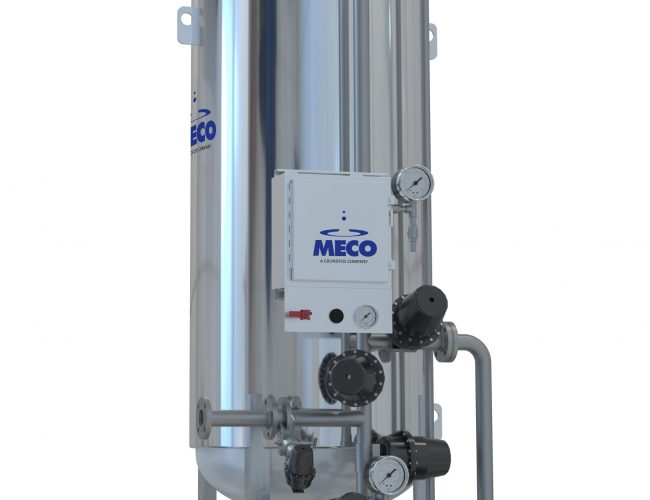
MECO carbon filtration systems are designed for the removal of chlorine or chloramines from various water sources used in food and beverage manufacturing processes. The MECO carbon filtration system is offered as a pretreatment process which strips the water of chlorine or chloramine before the water enters into a reverse osmosis membrane or vapor compression distiller. Carbon filters can be provided individually or as part of a total water treatment solution. MECO Carbon filters are designed specifically for your application using fiberglass, PVC, or stainless steel in the materials of construction. Dependent on your effluent water quality required and feed water analysis, a MECO representative will recommend the best solution for your pure water needs. Furthermore, each filter can be equipped with the MECO smartANALYTICS® package, a system of features that provides even greater value.
| MODEL | DIAMETER in INCHES [MM] | FLOW RANGE in GPM [LPM] |
|---|---|---|
| CF12 | 12 [305] | 2-6 [8-23] |
| CF18 | 18 [457] | 4-15 [15-57] |
| CF24 | 24 [610] | 6-26 [23-98] |
| CF30 | 30 [762] | 10-42 [38-159] |
| CF36 | 36 [914] | 14-61 [53-231] |
| CF42 | 42 [1067] | 19-84 [72-318] |
| CF48 | 48 [1219] | 25-111 [95-420] |
| CF54 | 54 [1372] | 32-142 [121-538] |
| CF60 | 60 [1524] | 39-177 [148-670] |
| CF66 | 66 [1676] | 48-216 [182-818] |
| CF72 | 72 [1829] | 57-260 [216-984] |
| CF78 | 78 [1981] | 66-309 [250-1170] |
| CF84 | 84 [2134] | 77-362 [291-1370] |
| CF90 | 90 [2286] | 88-420 [333-1590] |
| CF96 | 96 [2438] | 101-483 [382-1828] |
| CF102 | 102 [2591] | 113-551 [428-2086] |
| CF108 | 108 [2743] | 127-624 [481-2362] |
| CF114 | 114 [2896] | 142-702 [538-2657] |
| CF120 | 120 [3048] | 157-786 [594-2975] |
Notes: Vessels up to 48’ (1219 mm) in diameter are available in fiberglass. All vessels are available in carbon steel lined with Plasite 7159 and 316L stainless steel. Piping on fiberglass and carbon steel vessels is available in PVC, CPVC and 316L stainless steel. Piping on 316L stainless steel vessels is available in 316L stainless steel.
Using a carbon filtration system for your food and beverage water treatment needs can provide a tremendous number of advantages and vastly improve the quality of your product. Some of the most important benefits of using carbon filters for your food and beverage industry water treatment include:
Sterilization: One of the most important features of a quality food and beverage carbon filtration system is that it can sanitize your water by removing dangerous organisms and contaminants so that you can more safely use that water for washing and sterilization.
Equipment maintenance: Secondary benefits exist too, like the carbon filter’s ability to prevent reverse osmosis membranes from becoming clogged so that they can effectively strain out the contaminants that the carbon filter cannot, allowing for easier preparation of potable water.